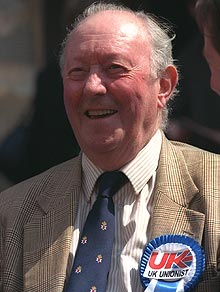Conor Cruise O'Brien | |
|---|---|
 | |
| Member of the Northern Ireland Forum | |
| In office 30 May 1996 – 25 April 1998 | |
| Constituency | Top-up list |
| Minister for Posts and Telegraphs | |
| In office 14 March 1973 – 5 July 1977 | |
| Taoiseach | Liam Cosgrave |
| Preceded by | Gerry Collins |
| Succeeded by | Pádraig Faulkner |
| Senator | |
| In office 27 October 1977 – 13 June 1979 | |
| Constituency | Dublin University |
| Teachta Dála | |
| In office June 1969 – June 1977 | |
| Constituency | Dublin North-East |
| Member of the European Parliament | |
| In office 1 January 1973 – 23 March 1973 | |
| Constituency | Oireachtas |
| Vice-Chancellor of the University of Ghana | |
| In office 1962–1965 | |
| Preceded by | Raymond Henry Stoughton |
| Succeeded by | Alexander Kwapong |
| Personal details | |
| Born | Donal Conor David Dermot Donat Cruise O'Brien 3 November 1917 Rathmines, Dublin, Ireland |
| Died | 18 December 2008 (aged 91) Howth, Dublin, Ireland |
| Political party | Labour Party |
| Other political affiliations | UK Unionist Party (1996–1998) |
| Spouses | |
| Children | 5, including Kate |
| Alma mater | Trinity College Dublin |
Donal Conor David Dermot Donat Cruise O'Brien (3 November 1917 – 18 December 2008[1]), often nicknamed "The Cruiser",[2] was an Irish diplomat, politician, writer, historian and academic, who served as Minister for Posts and Telegraphs from 1973 to 1977, a Senator for Dublin University from 1977 to 1979, a Teachta Dála (TD) for the Dublin North-East constituency from 1969 to 1977, and a Member of the European Parliament (MEP) from January 1973 to March 1973.
His opinion of Britain's role in Ireland subsequent to the partition of the island and the independence of the Free State in 1921 changed during the 1970s, in response to the outbreak of The Troubles. He now saw opposing nationalist and unionist traditions as irreconcilable, and switched from a nationalist to a unionist view of Irish politics and history, and from opposition to support for partition. Cruise O'Brien's outlook was radical and seldom orthodox. He summarised his position as intending "to administer an electric shock to the Irish psyche".[3]
Internationally, though a long-standing member of the Irish Anti-Apartheid Movement, he opposed in person the African National Congress's academic boycott of the apartheid regime in South Africa.[4] Views that he espoused during and after the 1970s contrasted with those he articulated during the 1950s and 1960s.
During his 1945–1961 career as a civil servant, Cruise O'Brien promoted the government's anti-partition campaign. In the 1960s he was associated with the 'New Left' and opposition to US military involvement in Viet Nam. At the 1969 general election he was elected to Dáil Éireann as a Labour Party TD for Dublin North-East. He served as Minister for Posts and Telegraphs, with responsibility for broadcasting, between 1973 and 1977 in a coalition government.[5] During those years he was also the Labour Party's Northern Ireland spokesman. Cruise O'Brien was later known primarily as an author and as an Irish Independent and Sunday Independent columnist.
- ^ ""Former minister and journalist Conor Cruise O'Brien dies", The Irish Times, 18 December 2008". The Irish Times. Archived from the original on 23 January 2022. Retrieved 18 December 2008.
- ^ "Conor Cruise O'Brien: farewell to Ireland's restless conscience". The Telegraph. 20 December 2008. Archived from the original on 27 February 2009. Retrieved 8 July 2009.
- ^ Akenson 1994, p. 364.
- ^ Akenson 1994, pp. 472–81.
- ^ "Conor Cruise O'Brien". Oireachtas Members Database. Archived from the original on 21 August 2019. Retrieved 9 November 2012.